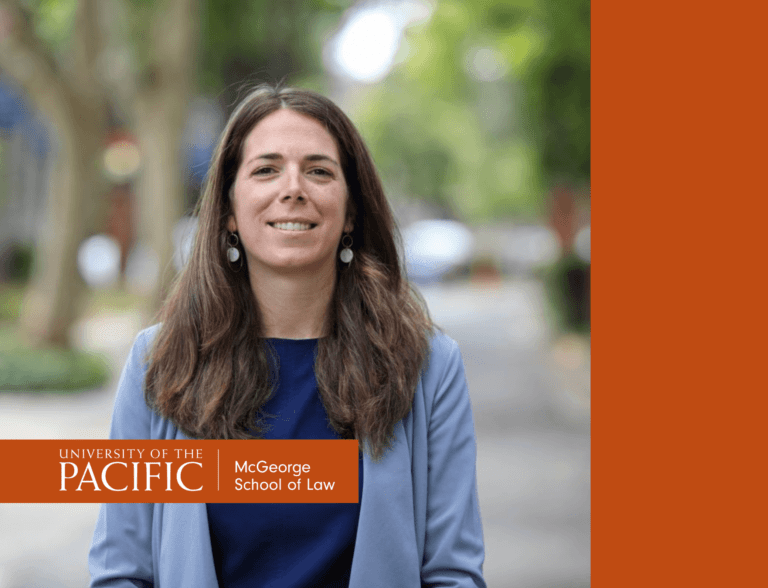NGO Career Outcomes: How an Online MSL Degree Can Jumpstart Your Water and Environmental Law Career
If you are passionate about water law and environmental law, this is a great time to pursue a career; personally, professionally, and globally. Clémence Kucera, Assistant Dean for the Graduate, Online, and International Programs, and guest speaker Kim Defino discussed the pathway from environmental enthusiast to successful advocate.
Kim is an adjunct professor and alumna of McGeorge School of Law. She is also the founder and president of Earth Advocacy, a consulting company that provides policy and advocacy guidance to nonprofits and foundations with the goal of protecting and restoring our lands, water and wildlife for future generations.

Passion and Advocacy
Kim earned her B.S. in political science and public service with an environmental policy emphasis from UC Davis and her law degree from, of course, McGeorge. For 3 years, she worked for a small public interest law firm performing environmental litigation representing nonprofit organizations. But a pivot was on her horizon “I realized that while I loved the issues that I was working on, I really enjoyed developing the policy rather than litigating. So I actually changed my focus.”
Fostering positive systemic change from the inside out, Kim was the State Director for Defenders of Wildlife for almost 20 years before she founded her own firm, Earth Advocacy. She has a broad range of experience under her belt and an even broader skill set: working in strategy, communications, and organization; with clients like Defenders of Wildlife, the National Audubon Society, land trusts, and foundations; at the federal and state levels.
Potential Positions in the Field
The water and environmental law field — unfortunately, due in part to climate change and all of the impacts that we’re experiencing — is growing. “I think you’re going to see, more and more, a need. And there are a lot of things that people can do with a legal or policy background in the private setting,” she encourages. If you want to work in a nonprofit setting, alternatively, “Having a policy background is essential to make progress on the big issues we’re tackling. There’s a wide range of issues that are out there that people can work on and roles they can play.”
Within this range, you can find your own niche. “You could spend your entire life just trying to understand water law and policy. What are the rules of the game, and what are the policies that the rules are trying to promote? That’s very important to understand.” As an example, if you want to protect an endangered species, you could really benefit from learning the basics of land use planning. The options are limitless.
The Keys to Success
There are certain skills needed to be successful in these positions. First, to state the obvious, you need to know the existing laws and regulations. But to state the less obvious, you also have to know the legislative process and the real-time steps it takes to move a project along. Kim imparts as much of this knowledge as possible in her McGeorge online courses.
“We do a survey of some of the biggest environmental laws out there, and we look at it from the perspective of, ‘Why do we have this? Why was this law written? How has this law been interpreted? How has this law evolved over time? And where are we now with the law?’” They take a critical look at climate change, the Clean Water Act, the integration between federal and state laws, and more, through nuanced analysis and practical assignments.
An Informed Approach to Teaching
The multifaceted perspective Kim hopes to teach her students was honed over time. She admits that, earlier in her experience and education, she only gradually uncovered the nuances. “I think I would have liked to have had a deeper understanding of the various layers,” she acknowledges. “I wish that when I was younger I had a better perspective. But I think the problem is, perspective only happens with age.”
This year, she created a project in which students wrote comment letters on proposed regulations stating whether or not they supported them and why. Essentially, she had them participate in the rule-making process. Another had students unite as teams and tackle climate change, everything from the implications of using nuclear power to integrating the opinions of stakeholders. Innovation and creativity are always at the core of McGeorge courses, even when they are online.
Expanding Perspectives
Kim encourages a thriving conversation throughout her class. In discussion threads, students and teacher have a back-and-forth around complex topics, which she thoroughly enjoys. “People have different perspectives and different ways of looking at things. And I often get feedback in those discussion threads, such as ‘I didn’t think about it like that, but that’s a really interesting way of putting it.’”
Ultimately, the dedication to ensuring her students’ optimal education comes back around. “My sense is, at the end of the day, when the students are done with the course they have a deeper understanding of federal environmental law. I’ve had students who now practice in the environmental field say, ‘you know this was really helpful.’”
McGeorge’s online MSL curriculum consists of courses like this one, taught by expert, supportive, and passionate professors. Apply now and take the first step towards a fulfilling career.












